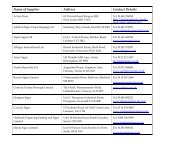titlepage/contents pg 1-16 - British Parking Association
titlepage/contents pg 1-16 - British Parking Association
titlepage/contents pg 1-16 - British Parking Association
Create successful ePaper yourself
Turn your PDF publications into a flip-book with our unique Google optimized e-Paper software.
132 Chapter 8In addition to leaflets andquestionnaires that are aimed atall those affected, a marketresearch exercise should beconsidered whereby in-depthinterviews are undertaken with alimited number of people. Dataon existing patterns of parking inthe area or in other parts of thelocal authority area can help bothin conducting such an exercise,and in understanding thesignificance of the results.For large schemes specialisthelp may be required for theconsultation process. Councilofficers will need to guide electedMembers on the effects on publicopinion of such matters asoperative hours, location ofrestrictions, the tariff structure,and permit rules.A number of issues are likely tofeature prominently in theconsultation process, including:●●The extent of the controlarea;Displacement of the parkingproblem from the newlycontrolled area to adjacentareas – the knock-on effectof drivers finding the nextavailable free or uncontrolledparking opportunity (seeChapter 7).● The allocation of kerb spacebetween different types ofuser, such as pay anddisplay, residents’ orbusiness permits, loading,and restricted parking; and● The issue of whethercharges will be made, and ifso at what level.Once the scheme has beenagreed or amended asnecessary, a formal period ofconsultation is required for theTraffic Regulation Order (TRO).This will be at least for the 21 daystatutory consultation requiredfor TROs. Again, good publicrelations should be committed tothe exercise to ensure thatadequate levels of awarenesshave been raised. This too isiterative and if significantobjections remain unresolved,the scheme may requireamendment and re-consultation.Handling objections toTROsIt is unlikely that all objectionscan be accommodated and so itis important to ensure that onceall opinions have been fairlyconsidered and a decisionreached, the council shouldcommunicate this decision. Thepublic needs to know whatchanges are to be made and thetimetable for their introduction.It is an important part of the TROorder-making process that theorder-making authority has toconsider objections to the orderbefore confirming it. Anycomment or suggestion that ismade in response to aconsultation should be fullyconsidered and provided with areasoned response. To simplyreject an objection or alternativeproposal because it does notconform to the council’s currentthinking or policy is inadequate.The objector’s view must beconsidered, given full weightand, if it is in conflict with currentpolicy, the policy itself must bereviewed and shown to be stillvalid.A report on objections should beprepared by the technicaladvisors to the authority, withcopies of all objections madeavailable to elected Members toinspect. The Members are betterable to discharge this statutoryprocess effectively if they havebeen closely involved in the nonstatutoryconsultation process.The consultationtimetableImplementing a major schemerequires substantial resources,and has to be planned,programmed and resourced. Inpreparing the programme thereare a number of constraints thatneed to be considered:1. Extensive consultation shouldnot be carried out in the schoolholiday periods, as this mayproduce a response that peopleare disenfranchised.2. The political and seasonalcalendar should be addressed. Itis unlikely to be acceptable to







